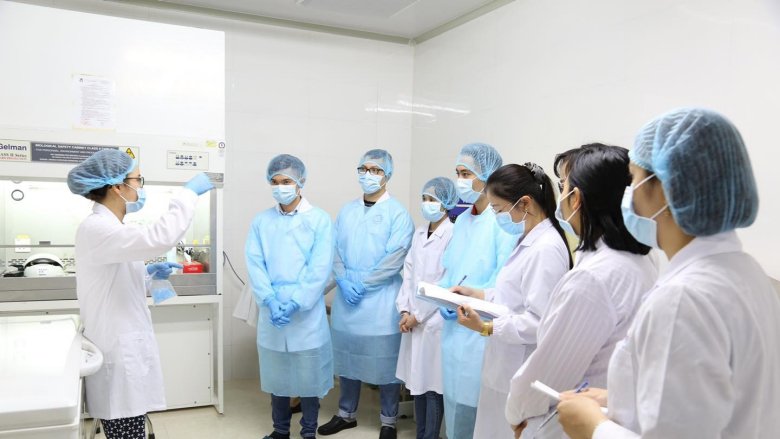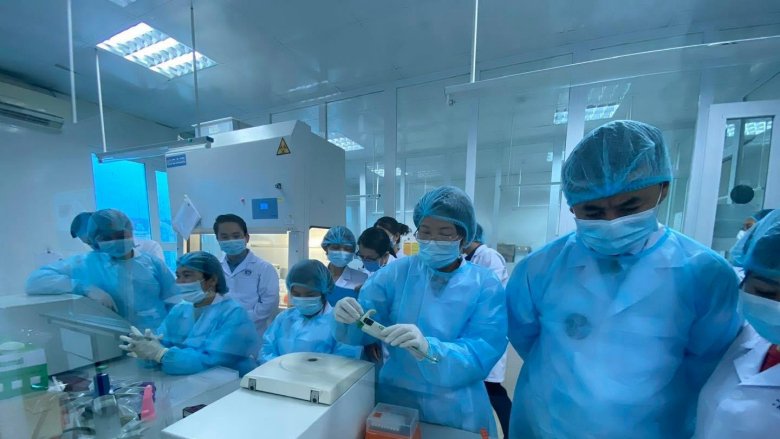Challenge
Vietnam was one of the first countries in the world to experience the emergence of COVID-19. Despite successfully containing the initial surges of the pandemic, the country faced an urgent need to bolster its capabilities for identifying and responding to COVID-19. There was a need to improve laboratory capabilities at the national and subnational levels in terms of both quality and quantity. At the onset of the pandemic in early 2020, the country had only four labs located in the four regional institutes of public health that were equipped to conduct COVID-19 tests. As a result, these labs faced overwhelming demand, resulting in significant delays in test results. This had a detrimental impact on pandemic prevention and control efforts.
Approach
To respond to the need to move quickly, the project provided investments and technical assistance to focus on three interventions: (a) strengthening the capacity of laboratory systems at Vietnam’s National Institute of Hygiene and Epidemiology (NIHE), (b) strengthening the capacity of laboratory systems nationwide to respond to COVID-19 (focusing on laboratories involved in COVID-19 surveillance and testing in hospitals and provincial Centers for Disease Control nationwide), and (c) strengthening research capacity for COVID-19 vaccines and test kits (by the Center for Research and Production of Vaccines and Biologicals [POLYVAC]).
Results
The project significantly enhanced testing and surveillance capacities in Vietnam by both expanding the number of laboratories providing testing for COVID-19 and reducing turnaround time.
- More than 640 staff from 28 localities—most in the northern part of Vietnam, and some in the central region—attended 25 in-person training sessions delivered by leading virologists from the NIHE. They were instructed on standard procedures of sample taking, testing techniques, quality control, and laboratory biosafety.
- Through training and equipment provided by NIHE through this project and other testing capacity-building programs, Vietnam made significant progress in expanding its testing capabilities during the pandemic period. The number of testing laboratories rose from just four in March 2020 to 94 within a year and 143 by the end of 2021. Average turnaround time to process tests fell from several days to four to six hours.
- NIHE and POLYVAC received 167 pieces of technical equipment, including a state-of-the-art electronic microscope system, putting them in a better position to conduct genomic surveillance of pathogens and develop effective testing kits and vaccines.
- The enhanced capacity of national laboratories and disease surveillance networks played a vital role in Vietnam’s containment efforts, keeping the caseload relatively low. NIHE actively supported provinces across the country by providing equipment and training to enhance their testing capabilities. This resulted in a significant increase in the number of COVID-19 tests conducted by the national lab alone. In 2021, the total number of samples tested reached 111,364, a significant surge from the previous year's total of 41,313 tests.
Bank Group Contribution
The World Bank allocated $6.3 million to this project through the Pandemic Emergency Financing Facility (PEF). The key contribution was the exceptionally rapid and effective support and supervision of project preparation and implementation.
Partners
The World Bank team collaborated with the World Health Organization (WHO) and the United States Centers for Disease Control and Prevention (US CDC) to determine what equipment to procure and what training to deliver. The technical staffs of the WHO and the US CDC helped develop standard operating procedures and trainings and provided updated information daily to support preparedness and responses.
Looking Ahead
Vietnam’s testing capacity was significantly enhanced, from around 14,000 tests a day to over 100,000 tests a day by the time the project closed. Vietnam can now respond to any emergency health event and pandemics on similar scale as the COVID – 19 pandemics.




